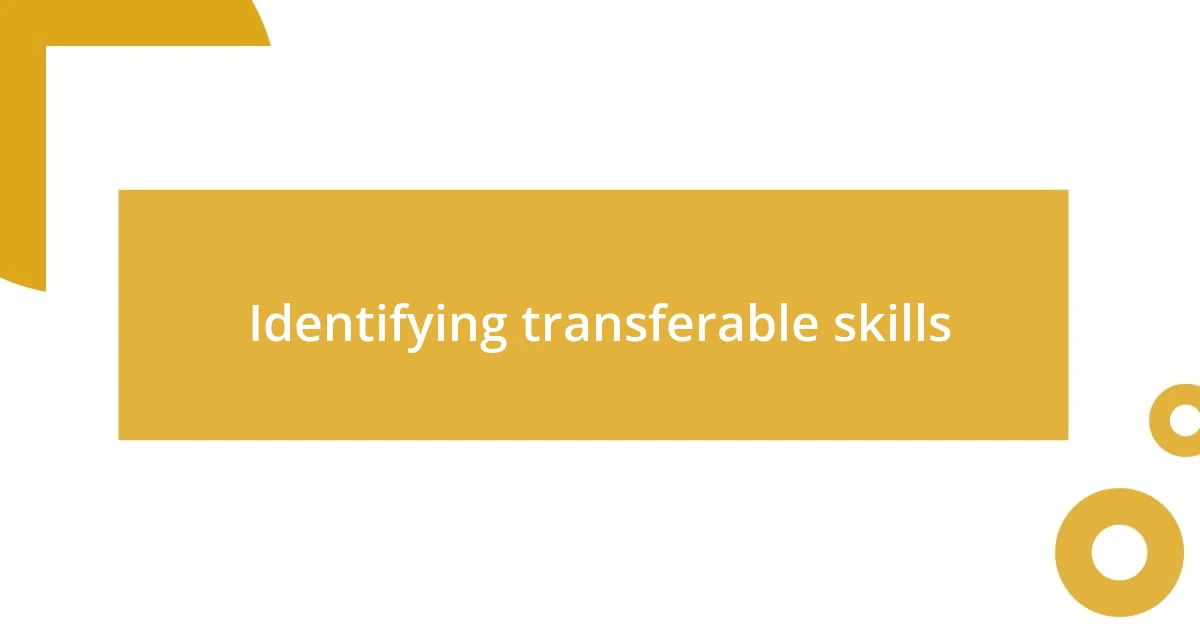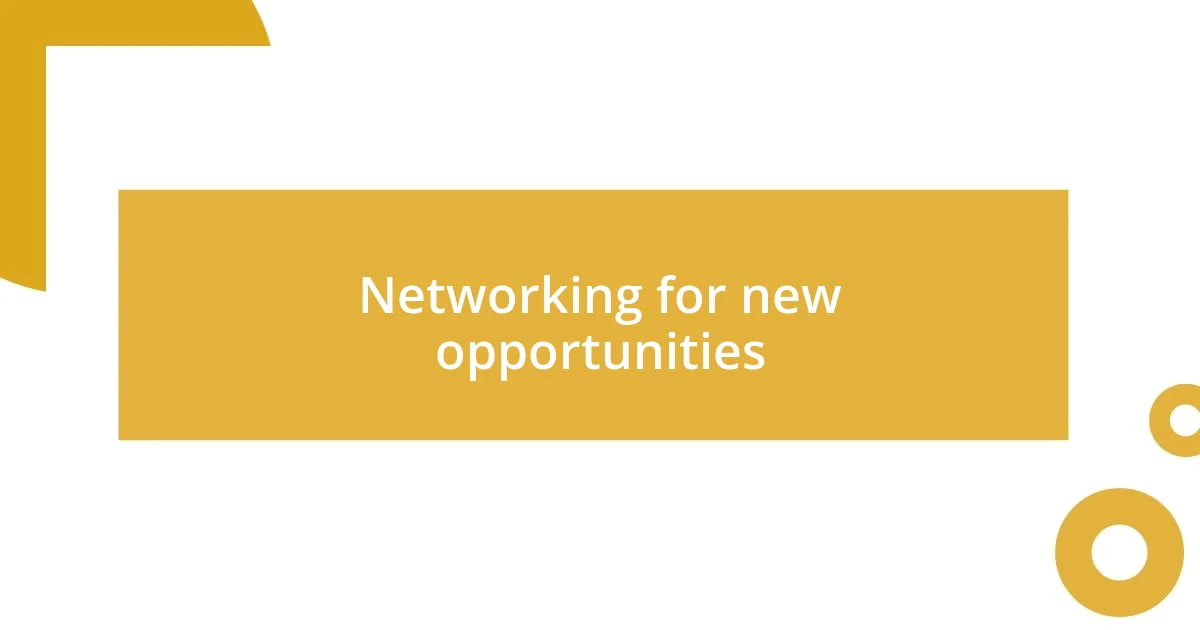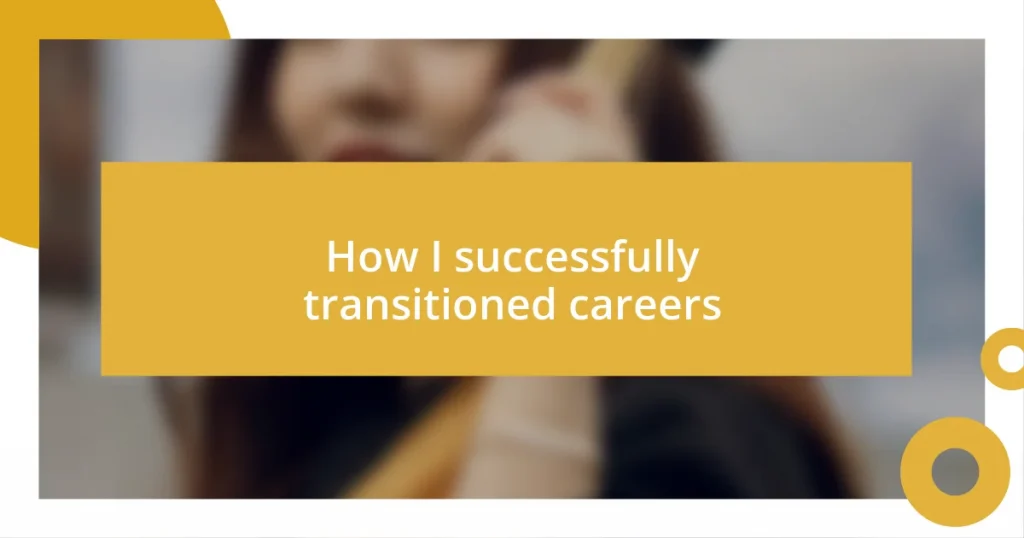Key takeaways:
- Embrace the uncertainty of career transitions and use introspection to identify motivations and transferable skills, which fosters confidence and clarity in the job search.
- Set specific, measurable, and value-aligned career goals to maintain focus and motivation throughout the transition process.
- Invest in networking and continuous learning, as building relationships and acquiring new knowledge are crucial for uncovering opportunities and adapting to new roles.

Understanding career transition process
Understanding the career transition process can feel overwhelming, and I can certainly relate to that feeling. When I decided to shift from my previous role, I had moments of doubt: Would I succeed? What if I made the wrong choice? These questions swirled in my mind, but acknowledging that uncertainty is part of the journey helped me find my footing.
One of the most enlightening aspects of transitioning careers is discovering your motivations. I remember reflecting on why I wanted to move away from my past role. Was it just about seeking growth, or was there a deeper desire to align my work with my values? This introspection not only clarified my goals but also reignited my passion, making the process feel less like a chore and more like an exciting adventure.
As I navigated my transition, I learned that the process isn’t linear. There were setbacks alongside progress, and that’s perfectly normal. I recall a specific instance when I applied for a job and didn’t hear back, leaving me disheartened. But instead of viewing it as a failure, I began to see it as a step in refining my approach. Each experience, good or bad, contributed to my growth and prepared me for the next opportunity on my journey. Have you faced similar hurdles? If so, remember that they are part of your unique story shaping your path ahead.

Identifying transferable skills
Identifying transferable skills is a crucial step in any career transition. I distinctly remember sitting down with a notebook, jotting down all the tasks I had executed in my previous roles. To my surprise, many of them aligned with the demands of my new career path. Skills like communication, problem-solving, and project management can seamlessly transfer from one field to another, which made me feel more confident about my prospects.
One exercise that I found incredibly helpful was creating a list of my accomplishments in my prior job. It was eye-opening to see how experiences from seemingly unrelated positions could be connected. For instance, my ability to lead a team during a challenging project turned out to be a significant asset when transitioning into a managerial role in a different industry. This process not only highlighted my capabilities but also boosted my morale significantly, reinforcing my belief in a successful transition.
Lastly, I encourage you to engage in conversations with peers or mentors. They can often point out skills you might overlook. During my transition, a colleague remarked on my knack for negotiation during a project review meeting. It was a skill I had taken for granted but became invaluable in my new role. Evaluating your existing skills with a fresh perspective can unveil the myriad of opportunities awaiting you in your career journey.
| Previous Position | Transferable Skill |
|---|---|
| Customer Service Representative | Communication Skills |
| Project Coordinator | Project Management |
| Sales Associate | Negotiation Skills |
| Technical Support | Problem-Solving Ability |

Setting clear career goals
Setting clear career goals is paramount when embarking on a new professional journey. I found that having well-defined objectives helped me maintain focus and purpose. Once, during a particularly tough week of job hunting, I took a moment to review my goals. They acted not just as my roadmap but also as my motivation, reminding me why I chose to make this transition in the first place.
Here are a few key elements to consider when setting your career goals:
- Be Specific: Instead of saying, “I want a new job,” clarify what role you’re targeting and why it excites you.
- Make Them Measurable: Set benchmarks for yourself, such as applying to five jobs a week to track your progress.
- Align with Values: Ensure your goals resonate with what truly matters to you, creating a more fulfilling path.
- Set Realistic Timelines: Give yourself a timeframe for achieving each goal, allowing flexibility but also accountability.
- Reflect Regularly: Periodically revisit and adjust your goals based on your experiences and changing aspirations.
I vividly recall how I laid out my goals on a vision board, with images and words that inspired me. It became a daily visual reminder of where I wanted to go. This crucial step undoubtedly shaped my perspective, pushing me to stay proactive—even on days when self-doubt crept in.

Networking for new opportunities
Networking has played a pivotal role in uncovering new opportunities for me during my career transition. I remember a casual coffee chat with an old colleague that turned into a game-changer; she introduced me to someone in a completely different industry that I had been eyeing. Without that initial outreach, I would have never discovered the open position that perfectly matched my skills and interests.
Building relationships doesn’t have to be formal or daunting. I found that attending local meetups related to my prospective field dramatically expanded my network. I was initially skeptical, wondering if I’d actually connect with anyone. To my surprise, I met several professionals who not only welcomed me but also shared invaluable insights about their journeys, sparking a sense of community I hadn’t anticipated.
Moreover, I’ve learned the importance of following up after meetings or events. After a networking event, I took a few minutes to send personalized messages to people I met, mentioning something specific we discussed. This small gesture cultivated a bond that went beyond the surface level, leading to ongoing conversations and sharing of job leads that significantly aided my transition. Have you ever reached out to someone after an encounter and been surprised at the positive response? It can really transform a simple connection into something much more meaningful.

Crafting an effective resume
Crafting an effective resume is an art, not just a task. I remember when I first revamped mine; I was filled with a mix of excitement and uncertainty. It felt daunting to condense my diverse experiences into a single page, but focusing on relevance made it easier. Specifically, I tailored my resume to highlight skills that were transferable to the new industry I was targeting. Have you ever looked at your resume and wondered if it truly reflects who you are? For me, that reflection was crucial.
One practical tip I discovered was the importance of quantifying achievements. Instead of simply stating my responsibilities, I showcased my impact by including concrete numbers. For instance, I transformed “Managed a team” into “Led a team of 10, increasing productivity by 20% in six months.” This small tweak made my accomplishments stand out. As I crafted each bullet point, I felt a sense of empowerment, realizing that I wasn’t just listing tasks; I was narrating my professional journey.
Finally, I can’t stress enough how essential it is to customize your resume for each position. It took me a few rounds of applications to understand that generic resumes didn’t resonate. For every job I applied for, I took the time to weave in specific keywords from the job description. This not only showed that I paid attention but also demonstrated my enthusiasm for each role. Have you considered how a personalized touch can make a world of difference? I found that this approach not only improved my chances of getting interviews but also reignited my passion for my career shift.

Preparing for job interviews
Preparing for job interviews is often as nerve-wracking as it is essential. I remember walking into my first interview after my transition, and my heart raced with both anticipation and anxiety. One strategy that really helped me was practicing common interview questions with a friend beforehand. It felt less daunting to navigate potential responses, and the mock interviews often led to moments of unexpected clarity about my own motivations and the unique value I brought to the table.
Delving into the company’s culture and values became a fascinating part of my prep work. I recall researching my interviewers on LinkedIn and discovering shared interests; this gave me a conversational edge during the interview. Did you know that referencing something specific about the company can make you memorable? It certainly worked wonders for me when I linked my previous experience directly to a recent initiative the company undertook. That connection not only showcased my enthusiasm, but also established a rapport that helped ease the tension in the room.
Finally, I made it a point to prepare thoughtful questions to ask at the end of each interview. I distinctly remember asking about the team dynamics, which opened up a rich discussion about collaboration that showcased my genuine interest. Taking the time to prepare meaningful questions not only demonstrated my curiosity but also created an authentic dialogue rather than a one-sided interrogation. Have you ever walked away from an interview feeling unclear about the company’s vision? Crafting a question that aligns with your values can truly transform your perception of the opportunity.

Embracing continuous learning
Continuous learning has been a cornerstone of my career transition journey. I remember a specific workshop I attended early on, where I felt a mix of nervousness and excitement. The facilitator mentioned the idea of lifelong learning, and it struck a chord with me. Have you ever considered how much easier it is to adapt when you’re open to learning? That moment made me realize that embracing new knowledge could not only help me gain skills but also boost my confidence.
When I first started exploring my new industry, I made it a goal to read at least one relevant book each month. This routine became a sort of personal ritual, something I genuinely looked forward to. I still recall diving into a book that completely shifted my perspective on teamwork. Are you aware of how books can unlock new ways of thinking? That particular read ignited a passion in me for collaborative projects, leading to some exciting opportunities in my new field.
Moreover, I engaged in discussions and online courses to supplement my learning. One afternoon, while participating in a webinar, I posed a question that sparked a vibrant discussion among participants. I felt a rush of adrenaline when others responded positively, affirming that my thoughts added value. It made me realize that sharing insights not only reinforces my understanding but also fosters connections with others navigating similar transitions. Have you thought about how learning in a community can enhance your journey? For me, those interactions became as valuable as the knowledge itself, making the learning process dynamic and enriching.














